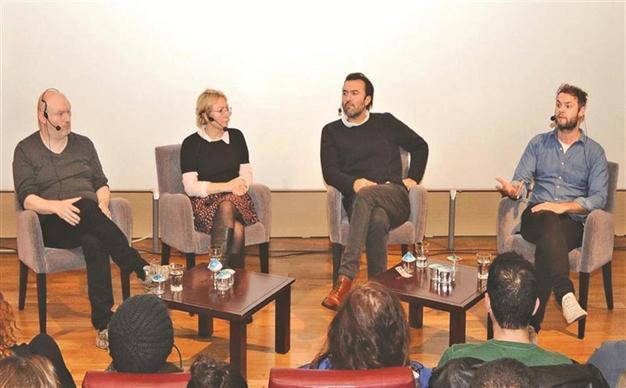Istanbul hosts workshop to gather Royal Court writers
ISTANBUL - Hürriyet Daily News

Fellow British playwright Zinny Harris and Ravenhill were in town for an organization led by the British Council.
Turkish playwrights are growing more confident as time goes on and Turkish theater circles are expanding to include bilingual plays as well, according to British playwright Mark Ravenhill, who has been attending a series of workshops in Istanbul over the past week with a group of regional up-and-coming playwrights.
Fellow British playwright Zinnie Harris and Ravenhill were in town for an organization led by the British Council, which aimed at bringing together the art’s known faces with a group of unknown writers in a project that would be spanning over a year’s time.
“I think one of the interesting things to notice is that how the Kurdish writers seem more confident and quite certain about their need to write in Kurdish. I think it’s a growing movement; sometimes you may have an audience that sees a play both in Kurdish and Turkish. There is a lot of in passion Kurdish theater and for bilingual theater as well,” Ravenhill said.
The workshop and writers The group of writers who had the chance to work with Harris and Ravenhill was a mixed group of writers from Iran and Turkey, who were required to place their work of art in their native languages before being picked out by a group of applicants to join the ride.
“We’ve been working with three languages in the room,” Harris said. “So when we came over here, we were curious about how it would work. But actually, the writers have been very generous with who they are and very open.”
“It takes a long time to get to know people and their culture, but I feel like we took a big step forward,” Ravenhill told me.
I asked the British playwrights whether or not they picked up any differences between the Western works of art and the workshop sessions, which consist of regional input, to which Harris said some differences exist, but the “essence of drama” remains the same.
“There is a sense of living in a different world. Well, not a different world, but a different landscape, so some of the subjects were particular. Of course they talk a lot about censorship, which is something Mark and I don’t really think about.”
The workshops seem to work out, however, the writers both agree on feeling “a leap forward,” in the sense of sharing and practicing, even for challenges that were “quite provoking.” A majority of the writers attending the workshops are Turkish, which ultimately brings us to the subject of Turkish theater and playwrights. Ravenhill, who has been to Turkey before, says a growing confidence can be seen among the Turkish artists.
Influences on Turkish writers“The British theater has been very influential on Turkish writers over the last decade. Maybe too many British plays in translation. Now, Turkish writers are getting more confident,” Ravenhill said.
The native language prequisite was something the British Council particularly focused on—which perhaps more than in any other context, easily had its reflections in the Turkish society. But the point, he adds, is not writing to represent anything in particular, but writing “the best possible play they want to write.”
“I think some of them might have more of a national expression or spirit. But their nationalities will only be a small part of the play. I don’t think they should write feeling that they represent their country or ethnicity but write the best play they could.”
As for the past five days they spent working with the group, Harris said they are “pleased” with the outcomes.
“I think we feel quite pleased that we’ve given them some stuff to chew on and we started to see some real differences in their writing. We saw big leaps,” Harris said. “Yeah, I think we saw steps forward. You put in some practice and ideas that will keep on giving over the next year hopefully, the stuff will keep coming back to them and be useful for a long time,” Ravenhill added.
